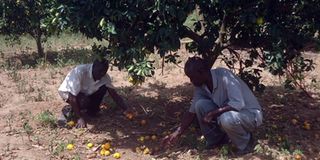Teso fruit farmers suffer setback

The loss. Mr Livingstone Omongole (right), an orange farmer in Okapel village, Kobwin Sub-county in Ngora District, picks spoilt oranges from his orchard recently. PHOTO BY SIMON PETER EMWAMU
What you need to know:
- On dry parched orchards, images of drying orange plants and rotting orange fruits forming a brownish canopy on the ground are an eyesore for farmers who have invested a fortune in buying pesticides and chemicals that barely yield results.
- Mr Stephen Okuluma, a presidential advisor on Teso Affairs, whose orange farm is severely affected, says there is need for government to streamline the supply and sale of pesticides and chemicals on the market.
Kampala. Barely three months before the long-awaited Soroti fruit factory starts operations, farmers have been dealt a heavy blow by multiple orange diseases.
Lucky to have been zoned as a citrus growing region 20 years ago, orange and mango growing in the districts of Teso sub-region was received with much enthusiasm. Orchards sprout up and seedling grafters undertook to supply the much needed seedlings by the National Agricultural Advisory Services (Naads), but the earlier gains among citrus farmers have been dealt a blow by untreatable pests and diseases.
On dry parched orchards, images of drying orange plants and rotting orange fruits forming a brownish canopy on the ground are an eyesore for farmers who have invested a fortune in buying pesticides and chemicals that barely yield results.
Mr Livingstone Omongole, 69, a farmer in Okapel, Kobwin Sub-county in Ngora District, is among the hard hit farmers. For the last two years, he has hardily banked more than Shs2m, yet four years ago, he would rake in more than Shs10m from his orange farm.
“I have tried several pesticides and chemicals for the last three years but I have not realised any change, the fruits immediately start dropping down as early as after flowering,” says the retired teacher.
According to Mr Omongole, it all started in 2012 when he witnessed a drop in the harvest. Later that year when he expected the harvest to have gone high following good rains, his farm was instead attacked by a leaf-wilting disease that he managed to fight off using fungicide.
A year later, his orchard, like that of many other farmers, was attacked by orange scub, black orange spot and fruit flies.
Mr Omongole, a member of Teso Tropical Fruit Cooperative Union Limited (TEFCU), is worried he and other farmers under the union might not be able to supply the needed quantities for the fruit factory.
The State Minister for Relief and Disaster Preparedness, Mr Musa Ecweru, who recently lost several tones of oranges to pests, blames the ministry of Agriculture, adding that amidst this epidemic, they have remained unbothered about the plight of citrus farmers.
Mr Ecweru says he has lost more than Shs90m this year alone, adding that the Soroti fruit factory could be a white elephant.
Mr Stephen Okuluma, a presidential advisor on Teso Affairs, whose orange farm is severely affected, says there is need for government to streamline the supply and sale of pesticides and chemicals on the market.
“The farmers have failed to know which of the drugs on the market are effective. What we buy as pesticides and chemicals are all adulterated yet they are very expensive,” he said.
Mr Okuluma blames the implementers of Naads for their current plight, adding that it was a big mistake that people in the region were oriented into citrus farming without having any lead research institute in the region on citrus.
Ms Justine Omeke Ididi, the chairperson TEFCU, believes there is need to invest in the research on orange growing.
She said the situation has been worsened by an open market were every “Tom and Dick” is allowed to multiply seedlings.




